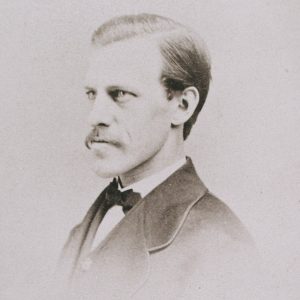
William Elliot Griffis was born in 1843 in Philadelphia, Pennsylvania. After serving in the Civil War, Griffis attended Rutgers in 1865. There, in the subjects of English and Latin, he tutored Taro Kusakabe, a Japanese student from Echizen (now Fukui) who would become the first Japanese graduate of Rutgers. In 1870, Griffis received an offer to teach English and science in Echizen, and later relocated to Tokyo University. Two years later, Griffis’s sister, Margaret Clark Griffis, joined him in Japan to teach at the Tokyo Government Girls’ School.
After finishing his studies at Union Theological Seminary and working in ministry, Griffis put his efforts into writing and lecturing. In 1876, he released The Mikado’s Empire, a text that became a widely accredited source in the English language on Japanese history and culture. He continued to author several other works on Japan, Asia, and the role of America in Asia. In 1900, he helped Inazo Nitobe write Bushido: The Soul of Japan, his most-well known book. For his work, Griffis was awarded the Order of the Rising Sun, Gold Rays with Rosette, as well as the Gold Rays with Neck Ribbon, by the Japanese government. After a lifetime of cultivating relations with Japanese students and associates as well as Western missionaries and oyatoi (foreign government advisors in Japan) Griffis passed away in 1928.
Today, the Griffis Collection at Rutgers University houses over 120 cubic feet of journals, photographs, and correspondence by Griffis, including his Fukui and Tokyo journals.
Sources:
William Elliot Griffis Biography. (n.d.). Retrieved January 30, 2020, from https://darkbooks.org/articles/William-Elliot-Griffis.html
William Elliot Griffis Collection. (n.d.). Retrieved January 30, 2020, from https://www.libraries.rutgers.edu/scua/griffis